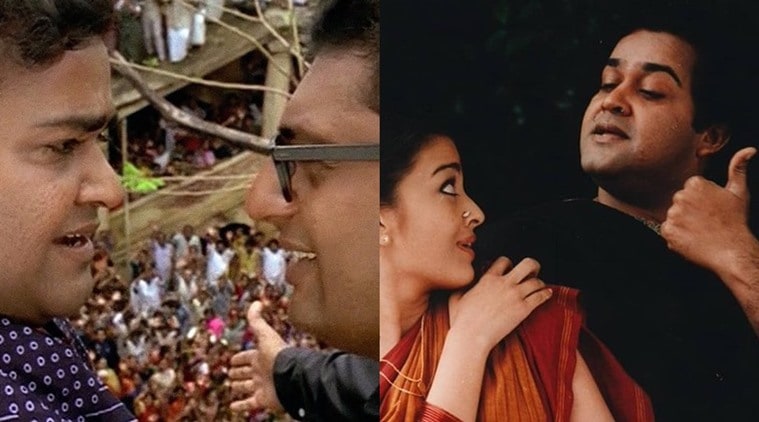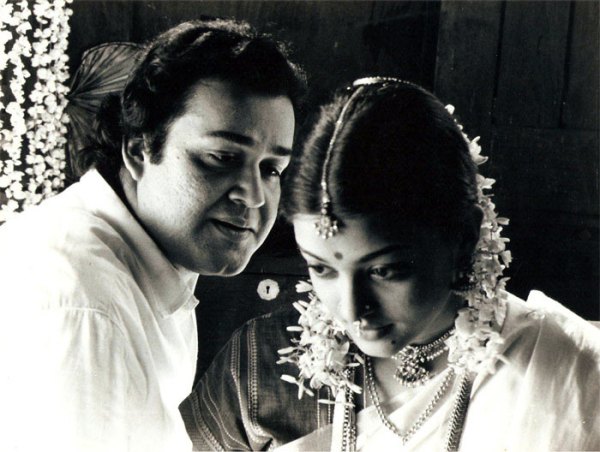In the eleventh edition of South Stream, we recommend director Mani Ratnam's Iruvar, starring Mohanlal, Prakash Raj and Aishwarya Rai Bachchan.
Director Mani Ratnam’s Iruvar opens with a close-up shot of a young boy. He is sitting in the window seat as he enjoys the sights from inside the speeding train. He has his mother by his side. As the train is set to enter the tunnel, the scene abruptly comes to an end, paving the way for opening credits to roll. This film is about the journey of this young man with big eyes full of big dreams. We don’t even know his name or never see him again in the movie.
After the movie title, we meet Anandan (Mohanlal), a young actor trying to make it big in the film world. Ratnam shows the audience the struggles and aspirations of Anandan in a collection of vignettes. By end of this stretch, Anandan has landed his first movie as a lead actor. Next, we see a train coming out of a tunnel and Anandan is riding the footboard of the train. Anandan was that boy in the opening sequence and this film is about his journey.
Ratnam was in top form as a visual director while making Iruvar. This film towered over all the other beautiful films that he had made until then. And it remains one of the best-made Indian movies of the 20th century. However, this film was not encouraged by the audience when it opened in cinemas during the Pongal holiday of 1997.
Iruvar (The Duo) is also the story about Tamizhchelvan (Prakash Raj), a young Tamil writer and poet, who would rise through the ranks to become a very powerful member of the Dravidian Movement in Tamil Nadu in the post-independent India. He is also struggling and trying to find a foothold in the film industry as a writer. Not just in reshaping Tamil Nadu politics, but he would also play a vital role in strengthening Anandan’s acting career with his dialogues that would make a legend out of an ordinary man.
This film is based on the lives and times of MG Ramachandran and M Karunanidhi, the two political giants in Indian history, who had humble beginnings in Tamil cinema. And it examines the men behind these legends. Ratnam is not in the business of hero-worshipping, myth-building and crowd-pleasing films.
Anandan is dressed in white dhoti and shirt and he makes no secret about the fact that he is a man of faith. Tamizhchelvan is wearing a black shirt, the colour of the Dravidian movement. And it needs no further explanation, he is an atheist. The only common ground they share is their love for cinema. And that’s why their first meeting is staged at a movie set.
Take, for example, the scene set on top of the fort where Anandan asks Tamizhchelvan about the changes he wants to bring if his party his voted to power. Tamizhchelvan talks about caste abolition, ending corruption and ushering in major social changes. But, what Anandan mainly wants is to end poverty and hunger. Now that the director has established the political goals of both the man, in a later scene he reveals the traits of these two characters that makes them so popular with the masses.
In the same location, Tamizhchelvan is standing on the top of the fort and Anandan on the ground. Tamizhchelvan is happy that the Dravidian Movement has entered into active politics but, Anandan is devastated because his debut film has been shelved halfway. While Tamizhchelvan goes back to his trademark Tamil oratory, Anandan criticizes him for talking such lofty ideas unmindful of his plight. Anandan says he would never understand his predicament unless he had gone without a meal for five days in a row or seen his father get beat up over unpaid debts.
Tamizhchelvan is moved by the outburst of Anandan and tells him: “If you ever enter politics, you will eat me alive.” Because even he knows that his poetic Tamil that speaks of ideology and social changes is no match for Anandan’s folkish Tamil that captures the urgency and stark reality of poverty.
Every scene, every camera movement, every word uttered is bundled with a slew of information that contributes to the narration, underlining a character’s state of mind and taking the story forward.
Iruvar may have clicked with the majority of film-going audiences if only Ratnam had spent some time playing up the struggles and disappointments of Anandan and Tamizhchelvan by turning it into a melodrama. But here the director focused on the characters and their evolution as they grow in power and popularity. He was unsentimental and daring in presenting the characters that were based on the most powerful and influential personalities of Tamil Nadu.
Iruvar (1997) is available on Amazon Prime Video and Hotstar.
Source: Read Full Article



